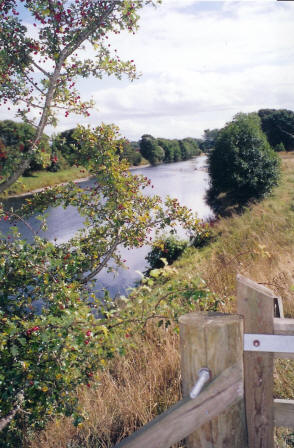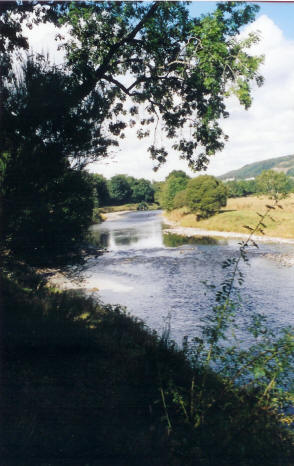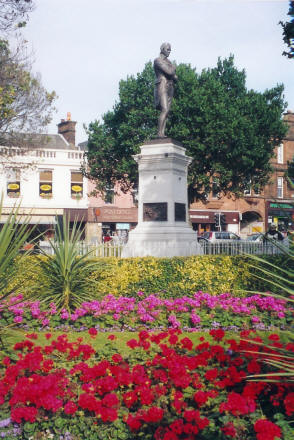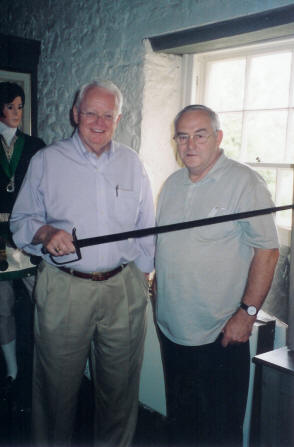The Life of Robert Burns
By Frank R. Shaw, FSA Scot
Part II


This article will focus on Robert Burns as a
young man. It seems strange to use the phrase “early manhood”
when Burns died at the all-too-early age of 37. Yet, it is
during his early manhood that he did his most prolific work with
poetry.
A very important event in the life of Robert Burns happened in
the summer of 1781 when he was 22 years old. He became a
Freemason in St. David’s Lodge in Tarbolton. This opened doors
for Burns, putting him in contact with men above his station in
life. It paved the way for an easier entrance into Edinburgh
literary circles where he was lionized on his first trip to the
city but shunned on his second one.
In my opinion, if there is a key to understanding Burns, it is
that one must recognize the complex and somewhat contradictory
nature of the man. In short, he was a paradoxical man who envied
those above him and was jealous of people who were richer than
he. He lashed out at patronizing superiors who discriminated
against the common man. If you incurred the wrath of his satire,
wit or sarcasm, you could be red-faced for days. This most
productive period of Burns, as far as his poetry is concerned,
began in the summer of 1784 and concluded in the autumn of 1786.
Little did he know he was moving from a well-known neighborhood
poet to one of international stature.
During this period Burns exhibited his ability to really express
his feelings on paper. His poetry, filled with emotion,
magically jumped off his pen. He moved beyond the conventional
ways of poetry and the use of rhyming clichés. He spoke from his
heart, guided by his Muse. Having suffered from poverty and
oppression, his poetry spoke of freedom, equality, hypocrisy,
humanity, tyranny, patriotism, love and the rights of man. He
led with his heart when it might have been better, in some
instances, for him to lead with his head. He was
straightforward. He has been described as “a man speaking to
men”. He said it best when he described poetry as “natural ideas
expressed in melodious words” and, in due time, Burns was quoted
by the high and mighty, as well as their servants.
Years later, Sir Walter Scott, who was a best selling author,
once wrote, “Long life to thy fame and peace to thy soul, Rob
Burns! When I want to express a sentiment which I feel strongly,
I find the phrase in Shakespeare - or thee”.
Burns continued to write great poetry at a spectacular rate
while carrying on complex love affairs with several women,
including Jean Armour and Highland Mary. (Clarinda came along
during his Edinburgh days.) Ironically, his greatest work was
produced during this time. He was planning to leave Scotland, to
flee his future father-in-law, when Poems, Chiefly in the
Scottish Dialect was published in Kilmarnock by John
Wilson in 1786.
With reviews appearing in the Edinburgh and London newspapers,
Burns achieved instant fame. He endured being patronized in
Edinburgh by the rich and learned members of the community. Yet,
he never met anyone of his stature in Edinburgh or even his
equal. As refined as Edinburgh was, there were no giants among
the crowd. Scott was a mere lad, and Hume was long gone. It was
said that it never dawned on the likes of Professor Dugal
Steward, the good Reverend Dr. Hugh Blair, or publisher and
author Henry Mackenzie that they were patronizing a man of
superior talent and ability from their own second-rate capacity.
Robert T. Fitzhugh once said, “Indeed, it never occurred to
these men and their friends that their chief claim to fame would
be their association with Burns.” A year later Burns would be
world famous.
It was in Edinburgh that Burns published an enlarged edition of
his book, which actually consisted of two printings with the
same content. It brought about the famous misprints in the
Address to a Haggis of “stinking” for “skinking” (watery)
and “Boxburgh” for “Roxburgh”, among the subscribers.
Soon his poems were being published in Belfast, Dublin,
Philadelphia and New York. Regretfully, due to poor copyright
laws, Burns never received a penny from the many pirated
editions. It is said that George Washington had a copy of the
Philadelphia edition. (Note: Burns wrote a great poem saluting
Washington and the Fourth of July.) Now famous and
internationally known, the great Bard was never to publish a new
volume of poetry. With the exception of Tam O’ Shanter,
probably his most famous poem, his career as a major
poet was over.
This farmer turned poet was about to make another big change in
his life. He was to become an exciseman, a hated taxman, and
leave farming for good. His duties would take him 200 miles a
week on horseback. He would leave the country life for the city
life and settle down in Dumfries. He would continue writing but
his emphasis was on Scottish songs. He had married Jean Armour,
his faithful and undemanding wife, who once said, “Our Robbie
should have had two wives.” Say what you want about Jean Armour,
she raised her own children, as well as some of Burns’ children
by other women.
In Part III of this series, we will look at the
last years of his life, dedicated to writing and editing
Scottish songs, or Airs as they were called in Scotland. The
series will then conclude with Part IV entitled “Looking Back at
Robert Burns”. (FRS: 3/23/05)



